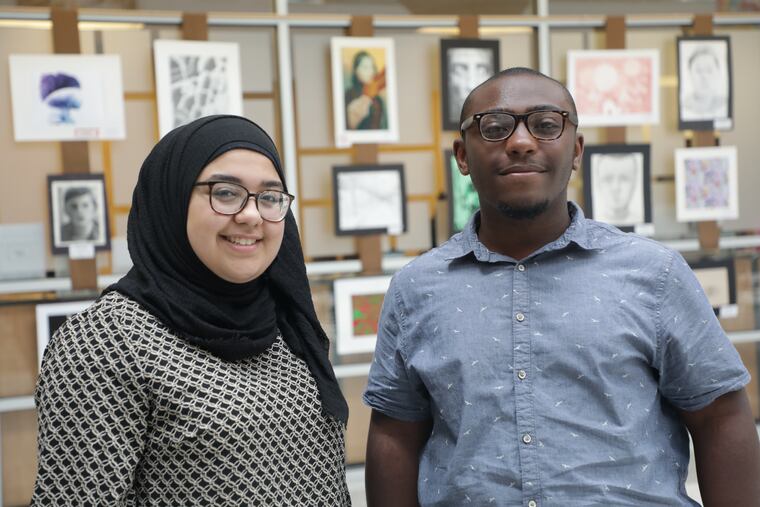Representing charters and Muslim women: Meet Philly’s newest school board members
Doha Ibrahim and Imere Williams will formally become student representatives to the school board later this month.

Doha Ibrahim came to the United States four years ago, and, like most teenagers in the city, attends a high school with no admissions requirement.
Imere Williams will be the first member of his family to graduate from high school; like one-third of all city students, he attends a charter school.
Meet the newest members of the Philadelphia school board.
Ibrahim, 17, is a senior at Abraham Lincoln High School in the Northeast. Williams, 17 and also a senior, attends Boys’ Latin of Philadelphia Charter School in West Philadelphia.
Later this month, they’ll formally become the student representatives to the board, and though they won’t be sitting in on executive sessions or voting on resolutions, the youngest members of the Philadelphia School District’s governing body will be briefed on all matters germane to the board and, most important, be expected to speak for some 200,000 students in district and charter schools throughout the city for the 2019-20 school year.
» READ MORE: After historic term on Philly Board of Education, what did 2 students learn?
“There definitely is some pressure,” said Williams. “I want to make everyone proud.”
Ibrahim was born and raised in Canada to Iraqi parents who fled violence in their home country. She moved to Philadelphia and the U.S. in 2015, entering Hamilton Disston Elementary as an eighth grader.
Classwork was far easier than it had been in Canada, but her peers weren’t always kind to a Muslim girl in a headscarf whose parents spoke little English.
“I started getting attacked in class,” said Ibrahim, who lives with her younger siblings and her parents, a stay-at-home mom and carpet-installer father. “Kids would pull my scarf off, say I was a terrorist.”
At first, she was angry at her classmates. Eventually, Ibrahim said, she understood that young people behaved that way because of things they needed — more behavioral and mental health resources, more after-school programs and activities to spark their interest during the school day.
“There’s just a lack of supports,” said Ibrahim, who dreams of studying international development and communications in college. “Students end up bullying, they ended up cutting class, they ended up not caring about schools.”
Because Ibrahim came to the U.S. during her eighth-grade year, she wasn’t able to gain admission to any selective schools because she had never taken PSSAs, the state’s standardized exams, which are part of entry criteria.
Her only choice was Lincoln, her neighborhood school. People warned her that it was a tough school, a bad place, but Ibrahim’s experiences have been overwhelmingly positive at a school she said is on the rise.
“I knew what I needed to get done, and I became a leader,” said Ibrahim, who joined Lincoln’s clubs and the district’s citywide student governing body. She even sat next to Superintendent William R. Hite Jr. when he addressed City Council this spring, giving her own pitch to Council about why the district deserved more funds.
Williams spent his early years as a student at Rhoads Elementary in West Philadelphia, in a section of town known as “The Bottom.”
“I’m from the inner city, and people have these stereotypes of people who come out of the inner city,” said Williams. “That motivated me to do well.”
He thought he’d be in traditional public schools until he graduated, but by fifth grade, Williams was bullied and eager to leave the school system.
In sixth grade, he enrolled at Boys’ Latin, learning Latin and being challenged in ways he hadn’t been before, and not just academically.
“I was shy, and not ready to come out of my shell, but my principal saw me as a leader,” said Williams, who draws inspiration from his mother, a single parent who grew up in foster care and lives with a disability but works as a housekeeper to give him advantages she never had.
At Boys’ Latin, Williams leads clubs, has sat on hiring committees, and is on the principal’s advisory committee. He wants to become a teacher someday, bolstering the ranks of black male educators in Philadelphia.
Williams thought a charter student stood no shot at becoming a board member; divisions between the city’s traditional public schools and its charters are well-documented. (The school board largely makes decisions about traditional public schools, but it also authorizes every charter school in the city.)
He’s excited to bring a charter voice to the board table.
“I think this whole war with public schools and charter schools is wrong,” Williams said. “The only way we’re going to be progressive is if we put our heads together. You’re not going to go anywhere divided.”
Williams also feels he speaks for the majority of Philadelphia students.
“I’m representing kids from the inner city, the kids who go to schools people consider bad,” said Williams, who spends his free time watching the reality TV show Survivor.
Like Williams, Ibrahim sees an opportunity in representing a group of people who often go unheard: Muslim women.
“Wearing a head scarf and being a Muslim, that’s a big thing for me,” said Ibrahim, who enjoys swimming, the TV show Grey’s Anatomy, and has her own photography business. “In our culture, it’s not easy to let girls stay after school to do things, but this is important.”